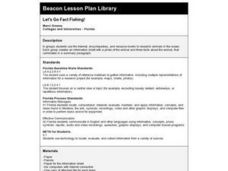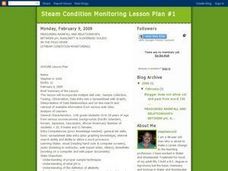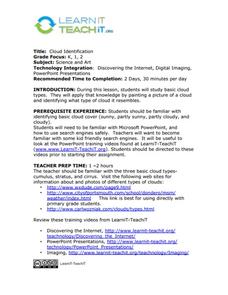Curated OER
"Declaration of Independence" From Plagiarism
So, what does the Declaration of Independence even mean? Learners of all ages paraphrase the Declaration of Independence in modern terms. They work as a group or class to paraphrase the language of the Declaration of Independence. There...
Curated OER
I'm Gone
Students plan a mock mission to Mars. In this space science instructional activity, students work in cooperative groups and select one experiment to take on their mock mission. Students create a mission plan form and send a proposed...
Curated OER
Intelligence in the Internet Age
Does technology affect our intelligence? Stefanie Olsen's article, "Intelligence in the Internet Age," and the thought provoking reading comprehension questions that follow, are sure to generate a lively discussion.
Media Education Lab
Sponsored Content as Propaganda
What is sponsored content? Who produces sponsored content? Why? Is it fair or unfair? What are the privacy implications for consumers? To answer these questions, class members view a model screencast before crafting their own that...
Annenberg Foundation
America's History in the Making: Using Digital Technologies
How can digital technology of today link us to the events of the past? Scholars use technology to uncover the vast number of historical resources available in lesson 12 of a 22-part America's History in the Making series. Using databases...
Curated OER
I Heard It 'Round the Internet: Sexual Health Education and Authenticating Online Information
Learners evaluate websites regarding sexual health information. For this media awareness lesson, students discuss facts and myths regarding sex as they determine how to find reputable online and print resources.
Curated OER
Solar Surfing
High schoolers explore sources of solar astronomy. They use the internet to identify web pages associated with solar observatories, astronomical organizations, and educational sights associated with both. Students identify the type of...
Curated OER
Who Wrote That?
Students explore the Project Gutenberg website and conduct a webquest to answer questions about well known literature and authors.
Curated OER
Clash of Cultures: Comparing the 1920s and 1960s
Students compare the social, cltural and politicalp roblems of the 1920s with the 1960s.
Curated OER
Clash of Cultures: Comparing the 1920s and 1960s
Students identify the social, culturaland political problems of the 1920s and compare them to the problems of the 1960s. They research both eras and then make a presentation to the rest of the class.
Curated OER
Blast the Fats
Students examine the fats found in foods. In this nutrition activity, students identify the types and amounts of fats found in foods as they research food labels and the Internet. Students classify the fats and record their data.
Curated OER
What is a Hurricane?
Students research hurricanes on the Internet. In this hurricane lesson, students use the Internet to find out the basic shape of hurricane winds and classify three characteristics of hurricanes. Students then classify at least three...
Curated OER
Geometric Art In Our World
Students explore ways art and math can be blended together in world around them. They recognizes geometric shapes and designs in artwork, and create their own artwork blending the two concepts.
Curated OER
Sergei Prokofiev's "peter And the Wolf": Learning And Creating
Students write their own version of "Peter and the Wolf". They explore the characters and the instruments that represent the characters. They use graphic organizing software to brainstorm ideas for characters and story lines for...
Curated OER
Let's Go Fact Fishing!
Learners work in pairs to research animals in the ocean. They use the Internet, encyclopedias, and resource books to complete an information sheet with a photo of the animal and three facts. They present their mini-reports to the class.
Curated OER
Measuring Rainfall and Relationships Between pH, Alkalinity and Suspended Solids in the Pago River
Eleventh graders test the pH and alkalinity of Pago River. In this ecology lesson plan, 11th graders collect data and use spreadsheet to graph results. They analyze and share their findings with the class.
Curated OER
Countries on the Internet
Students discover interesting and factual information about another country using the Internet and produce a flyer consisting of the information they find.
Curated OER
The Watson's Go to Birmingham, 1963
Learners conduct research to obtain geographical information about the author. They create brochures or fliers to highlight the author as a guest at a mock author's conference. They answer questions on the Cyber Fact Scavenger Hunt...
Curated OER
Parts of a Tree
Students identify four parts of trees. In this plant biology lesson, students read the book Trees and conduct Internet research to identify the parts of the tree. Students take notes from each website and complete an included worksheet.
Curated OER
An Uplifting Experience
Fifth graders research and complete a graphic organizer about the principles of flight. In this aviation lesson plan, 5th graders experiment to understand the work of Daniel Bernouli and his discoveries about air pressure. Students...
Curated OER
"What is an American?"
Eleventh graders ponder about what it means to be an "American." They discuss the impact of an author's word choice and sentence structure on text. They identify some major themes and development of the Letters... Compose paragraphs and...
Curated OER
Cloud Identification
Young scholars study types of clouds. In this earth science instructional activity, students read the book The Cloud Book. Young scholars use photos to examine each type of cloud and visit suggested websites.
Curated OER
The Geometry of Circles
Learners review the parts of a circle, calculate the circumference and area of a circle, and create student-made tests on the geometry of circles using educational software.
Alabama Learning Exchange
Do You Have a Babushka?
Young scholars retrieve information about Patricia Polacco from selected sources. They classify information into prescribed categories on a concept map.

























